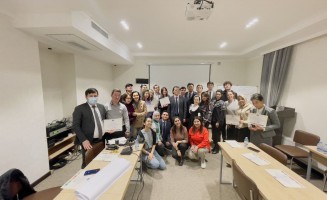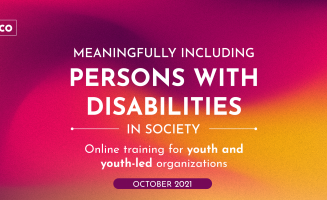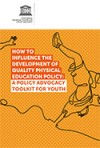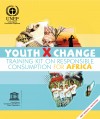
Welcome to the UNESCO Youth Programme
Youth have the creativity, the potential and the capacity to make change happen – for themselves, for their communities, and for the rest of the world. UNESCO works with young people and is committed to accompany them to work together to drive social innovation and change, participate fully in the development of their societies, eradicate poverty and inequality, and foster a culture of peace.
UNESCO has engaged with thousands of youths to create change through its fora, built solid youth networks, reached young people to work on peacebuilding and prevention of violent extremism, and is committed to empowering underprivileged youth by providing them with spaces to participate.
The United Nations defines ‘youth’ as persons aged between 15 and 24. However, this definition is flexible. According to the World Youth Report (2018), there are 1.2 billion young people aged 15 to 24 years, accounting for 16 per cent of the global population. The experience of being young can vary substantially across the world, between countries and regions, and ‘youth’ is therefore often a fluid and changing category. As such, context is always an important guide in UNESCO’s definition of youth.
We encourage engagement of youth in UNESCO’s action from design to implementation and follow-up, in their communities through the scaling up of youth-led initiatives, and in the policy agenda through the integration of youth concerns and issues.
To this end, UNESCO also encourages Youth Spaces aimed at empowering young people, fostering and supporting their action, promoting partnerships, and ensuring their recognition and visibility.
Scroll down to discover more about UNESCO’s work on youth, including its Operational Strategy on Youth (2014-2021), the UNESCO Youth Forum process, and other news, events and opportunities to get involved in. Don’t forget to sign up to the Online UNESCO Youth Community!
Youth as Researchers: exploring the impact of COVID-19
 The Youth As Researchers (YAR) global initiative on COVID-19 connects and engages with youth to conduct research on the impacts of the COVID-19 pandemic on young people and the responses this population has implemented to tackle these issues. UNESCO and the UNESCO Chairs at the National University of Ireland Galway (NUIG) and Penn State University (PSU) lead a consortium of youth-led or youth-related actors to support the research through training, mentoring, and coordination.
The Youth As Researchers (YAR) global initiative on COVID-19 connects and engages with youth to conduct research on the impacts of the COVID-19 pandemic on young people and the responses this population has implemented to tackle these issues. UNESCO and the UNESCO Chairs at the National University of Ireland Galway (NUIG) and Penn State University (PSU) lead a consortium of youth-led or youth-related actors to support the research through training, mentoring, and coordination.
Learn more about the initiative
Operational Strategy on Youth
Recognizing the force, creativity, energy, know-how and capacities of young people, UNESCO prioritizes its work with and for youth across all its programmes. It is guided in this by its Operational Strategy on Youth (2014-2021), which is the result of a long process of consultation, engaging young people and Member States. As such, it responds to global youth needs and aspirations. This serves both to consolidate and innovate UNESCO’s action on youth.
In line with the Agenda 2030, the Strategy is built on the premise that youth are key partners and actors for development and peace. It also provides the framework for constructive partnerships with and between youth organizations and youth-related stakeholders.
The Strategy puts forward three multidisciplinary and complementary axes of work, which incorporate the full range of UNESCO’s expertise in its fields of competence, namely 1) policy formulation and review with the participation of youth 2) capacity development for the transition to adulthood and 3) civic engagement, democratic participation and social innovation.
Youth Forum
The Youth Forum process is an essential part of the UNESCO Youth Programme. Since 1999 and until today, it has provided an innovative opportunity for youth to dialogue among themselves and with UNESCO, to provide orientations to UNESCO’s approach and to present their concerns and ideas to Member States through UNESCO’s General Conference, which is UNESCO’s highest decision-making body.
Young people come together every two years, and bring their collective energy, creativity and vision to the table. The UNESCO Youth Forum is shaped by and for youth, from the preparatory stages to the event itself at UNESCO’s Headquarters in Paris, France.
Through debate and discussion, youth draw up recommendations for action, reflecting the most pressing needs and concerns of youth today in the fields of UNESCO’s mandate.
- 12th UNESCO Youth Forum – Co-creating with Youth the post-COVID period
Online from Paris, France, 19 November 2021 - Read the Conclusions of the Youth Forum
also available in Arabic, Chinese, French, Russian and Spanish
See also:
Global Youth Community
The UNESCO Global Youth Community (GYC) is an inclusive platform, run by youth and for youth. It aims to provide a space that fosters youth-to-youth collaboration and intergenerational learning, and increases the visibility of youth action and work of young change-makers.
This initiative emerged during the 11th UNESCO Youth Forum (November 2019). 75 young people, from all regions of the world and leading ground-breaking change in their countries and communities in UNESCO’s domains, gathered to discuss the best strategies to improve Youth Engagement with UNESCO. They created the UNESCO Global Youth Community.
Resources
- Man and Biosphere (MAB) Youth
- UNESCO Courier: How youth drive change (2011)
- Asia-Pacific Interagency Network on Youth (APINY)
- Estamos Comprometidos - movement of young Latin Americans seeking to generate impact by developing innovative initiatives (in Spanish)
- United Nations for Youth
- UN Envoy on Youth
- UN Youth Volunteers
- UN World Youth Report
- Youth4Peace
- Youthpolicy.org



















